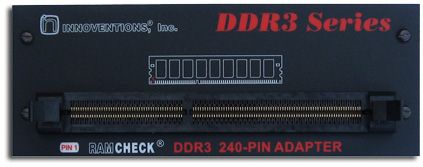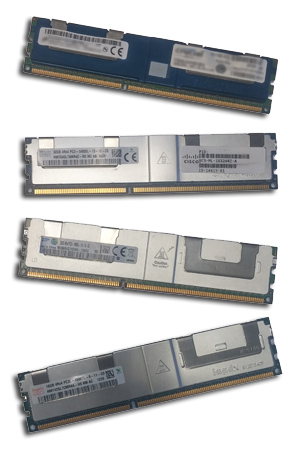DDR3 LRDIMM Memory Tester
The RAMCHECK DDR3 Adapter (p/n INN-8668-16) supports testing 240-pin DDR3 LRDIMM (load-reduced) 16GB and 32GB server memory that complies with JEDEC standards. (For testing 64GB LRDIMM, please see the section on known limitations at the bottom of this page.)
LRDIMM testing is available only with the RAMCHECK LX base tester (INN-8686). The older RAMCHECK base tester (p/n INN-8668) does not have the current consumption (i.e. power) capabilities needed for testing DDR3 LR-DIMM server modules. Please note that a RAMCHECK base tester can be factory converted to the RAMCHECK LX level.

DDR3 LRDIMM modules include an advance Memory Buffer (MB) device that interfaces the memory devices to the module's connector. The MB device requires an elaborated configuration by the RAMCHECK LX tester, and in turn it provides access to all the ranks of the module.

DDR3 LRDIMM modules are visually distinguished from regular DDR3 modules by the metal casing and the unique raised rectangle near the middle of the module under which the MB is placed. The samples shown above use a vertical placement of the MB device. Other modules may use horizontal placement for the MB.
As with all of our RAMCHECK LX test configurations, each module's size, structure, and type are automatically detected, without the need for user's setup. The RAMCHECK DDR3 adapter is very simple to operate, with little training or setup required.
Because the DDR3 LRDIMM modules use the MB device (which has built-in advanced memory testing capabilities), the test flow for LRDIMM modules is substantially different than the standard RAMCHECK LX test flow.
LRDIMM testing does not work on RAMCHECK. It requires the RAMCHECK LX higher current capabilities.
RAMCHECK Users: Convert your existing RAMCHECK memory tester to the RAMCHECK LX and save more than 55% off the price of a new unit!

Currently, DDR3 LRDIMM modules are tested by a modified (and significantly longer) Basic Test. After the Basic Test ends, the test results screens remain on the tester's display. Later firmware versions will add an advanced Auto-Loop burn-in process.

|
DDR3 LRDIMM TEST is a relatively long single test. This screen demonstrates the test of a 32GB module, at 1.5V. This module is factory rated at 1866MHz but is tested at 800MHz. |

|
This screen demonstrates the test of a 16GB module, at 1.35V. This module is factory rated at 1333MHz but is tested at 800MHz. |

|
When RAMCHECK LX completes testing of module the entire LRDIMM, it signals a successful result with this screen and the standard RAMCHECK LX "success beep." Notice that the test time is relatively long, about 13 minutes in this case. |
| LRDIMM Test OK | |

|
At the end of a successful LRDIMM TEST the display stays with this screen until the user press ESC. This is useful due to the relatively long test, allowing the user to let the test go automatically unattended and return later to view the results. |

|
This screen appears at the end of a successful 16GB LRDIMM test. |

|
Results appears at the end of the test. They are also kept in the test log as seen below. Test results in this screen are similar to common DDR3 DIMM test results. |

|
Additional test results screens follow. You can press F5 to access the SPD. |
| MANY ADDITIONAL LRDIMM TEST RESULTS APPEAR IN THE TEST LOG | |

|
Many specific tests that are unique to the LRDIMM architectures are conducted and reported in the Test Log. This screen indicates that the Memory Buffer (MB) chip tested OK. Other information for our on-going R&D efforts are coded in the 4th line. This is why we would appreciate receiving your test logs (see below). |

|
This 32GB LRDIMM modules use 16 address rows, 11 address columns and 4 ranks. |

|
This 16GB LRDIMM modules use 15 address rows, 11 address columns and 4 ranks. |

|
Various type data are extracted from the test. In this example, rank 1 uses address mirroring. |

|
This screen reports various tests that are run on specific ranks of the tested LRDIMM module. |

|
This screen indicated that the entire memory array tested fine, without intermittent errors (i.e. BT Retests: 0). |
The DDR3 LRDIMM support incorporates numerous enhancements over our regular DDR3 technology, some of which are currently implemented in the diagnostic tests and will be gradually enabled in upcoming firmware versions. Please note that the following technical specifications are subject to change while we continue to develop the RAMCHECK LX DDR3 LRDIMM testing algorithms.
| Includes all or most of the features and capabilities of the regular DDR3 testing as described in the DDR3 adapter page, with the exception of the modified test flow as described above. |
| Supports all SMBus access for the Memory Buffer. |
| Supports all Control Words for the Memory Buffer. |
| Four -S control lines for up to 8-rank devices (with Rank Multiplication). |
| DDR3 Data rates: 800MHz. Higher speed DDR3 LRDIMM modules can still be tested at a lower frequency. |
| Support advanced MemBIST tests using
the Memory Buffer. |
| Automatic 1.5V/1.35V selection and testing, with a wide support range of 1.35V to 1.8V at 10mV increments. |
| Improved current and temperature measurement circuitry. |
| Automatic LRDIMM detection and MB setup. |
| Support for Transparent Mode testing. |
| Parallel testing capability of 72-bits. |
| Rugged, 240-pin test-quality ZIF socket for convenient module handling. |
| Complete SPD programming support. |
| DDR3 LRDIMM SUPPORT - KNOWN LIMITATIONS | |
|
|
It is important to note that if you run across a group of modules that fail and they are from the same manufacturer, it is likely a support issue with the firmware. Support will be added to the RAMCHECK LX in future firmware versions.
In some instances, RAMCHECK LX will provide the
following screen when a test error is detected and
there is a good likelihood that the problem is a
software support issue rather than a defective
module:

When you contact
Tech Support, we will need the test log for this
module as we include various codes that relate to the
module's structure and behavior. To capture test logs,
please run the RAMCHECK LX while it is connected to
the PC Communications
program. At the end of the test, save the test log into
a text file and attached it to your e-mail.
If you already own RAMCHECK LX and DDR3 adapter, you should be able to test DDR3 LRDIMM modules as described above, by merely upgrading the firmware (if needed). To purchase our products, please click here for pricing and further information, or call INNOVENTIONS at 1-281-879-6226.

